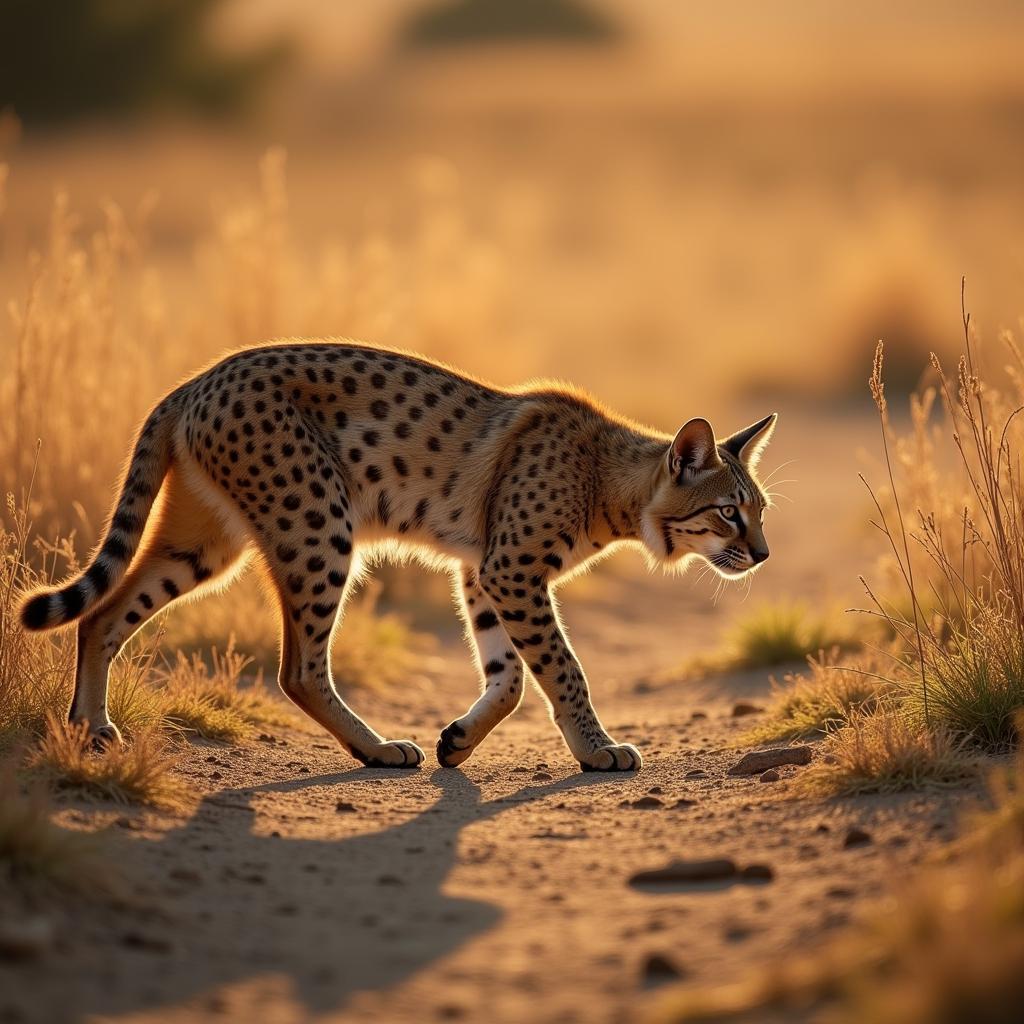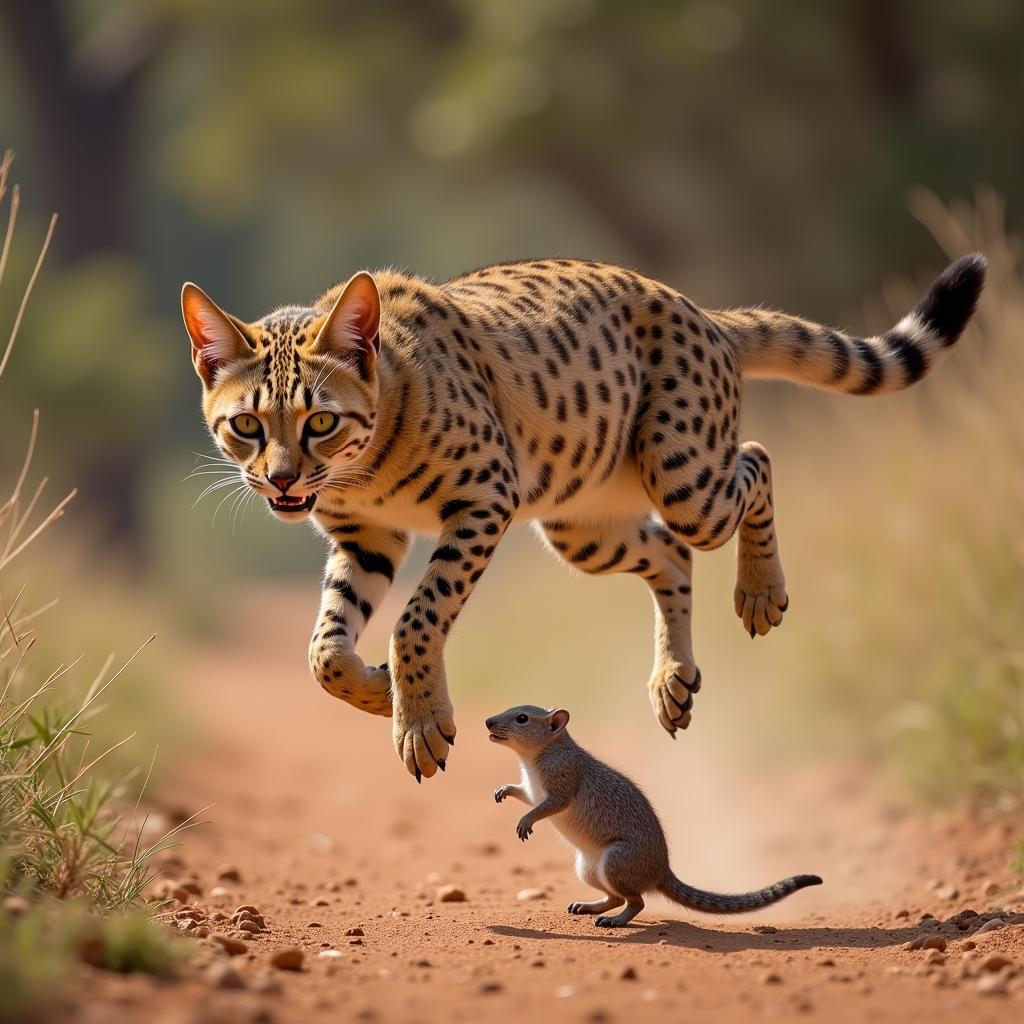Unveiling the Secrets of the African Wild Cat
The African Wild Cat, a fascinating creature with a mystique as captivating as its namesake continent, is often misunderstood. Far from being just a feral house cat, this wild feline boasts a rich history, unique characteristics, and a crucial role in the African ecosystem.
 African Wild Cat in Savannah Grassland
African Wild Cat in Savannah Grassland
A Closer Look: Unveiling the True African Wild Cat
While they might share a resemblance to our domestic companions, African wild cats ( Felis lybica lybica) are a distinct species. Smaller than their domesticated counterparts, they possess a sandy-grey coat providing excellent camouflage in their native habitat. Their lean, muscular build, coupled with sharp claws and teeth, make them adept hunters, perfectly adapted to the challenges of the African wilderness.
 African Wild Cat Hunting Prey
African Wild Cat Hunting Prey
Habitat and Range: Where the Wild Things Roam
African wild cats are incredibly adaptable, thriving in a diverse range of habitats across Africa, excluding the Sahara Desert and the rainforest regions of Central Africa. From the savannas and grasslands to the mountainous terrains, these felines display a remarkable resilience. Their ability to survive in such varied environments speaks volumes about their adaptability.
African Wild Cat vs. Domestic Cat: Dispelling the Myths
One common misconception is mistaking feral domestic cats for their wild counterparts. While visual similarities exist, several key differences set them apart. African wild cats are generally larger and more muscular, with longer legs and a distinctive black-tipped tail. Their behavior also differs significantly; they are solitary and elusive creatures, avoiding human contact.
A Vital Role: The African Wild Cat’s Place in the Ecosystem
African wild cats play a crucial role in their ecosystem as apex predators. Their diet primarily consists of rodents, birds, and reptiles, keeping populations in check and contributing to the delicate balance of their environment. Their presence is a vital indicator of a healthy ecosystem.
Threats and Conservation: Protecting a Vital Species
Unfortunately, African wild cats face numerous threats, including habitat loss due to human encroachment, hybridization with domestic cats, and diseases. Conservation efforts are crucial to ensure the survival of this remarkable species. Supporting organizations dedicated to protecting their habitat and educating local communities about their importance can make a significant difference.
FAQs: Unraveling the Mysteries of the African Wild Cat
1. Are African wild cats dangerous to humans?
African wild cats are naturally wary of humans and typically avoid contact. While they are skilled predators, attacks on humans are extremely rare.
2. Can you keep an African wild cat as a pet?
No, African wild cats are not suitable as pets. They are wild animals with specific needs that cannot be met in a domestic setting.
3. How can I help conservation efforts for African wild cats?
You can support organizations dedicated to their conservation, raise awareness about their plight, and advocate for responsible land management practices.
Beyond the Wild: Exploring More About African Wildlife
Interested in learning more about the fascinating creatures that share the African continent with the wild cat? You can delve deeper into the world of:
- African Bush Cat: Explore the world of this small but fierce feline.
- African Cat Wildcat: Discover more about the unique characteristics and behavior of the African wild cat.
Connect with Us: Your Journey into African Life Continues
For more captivating stories and insights into the diverse tapestry of African culture and wildlife, stay tuned to “African Life”. We are your gateway to exploring the wonders of this extraordinary continent.
Need assistance? Contact us at:
- Phone: +255768904061
- Email: kaka.mag@gmail.com
- Address: Mbarali DC Mawindi, Kangaga, Tanzania.
Our dedicated customer support team is available 24/7 to assist you.




